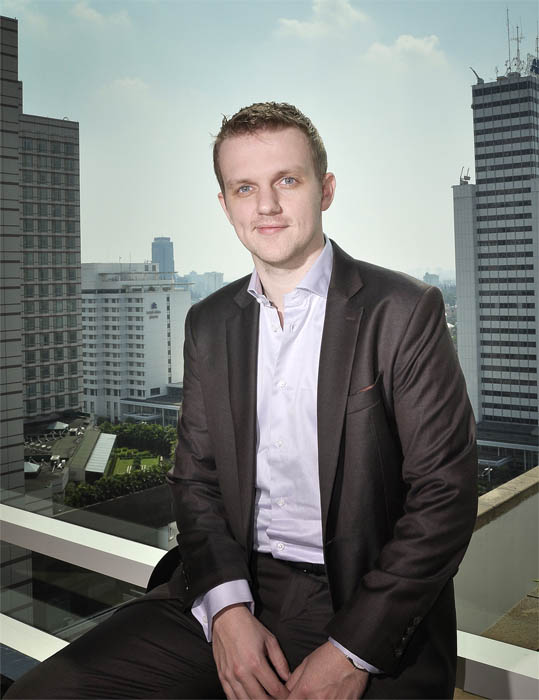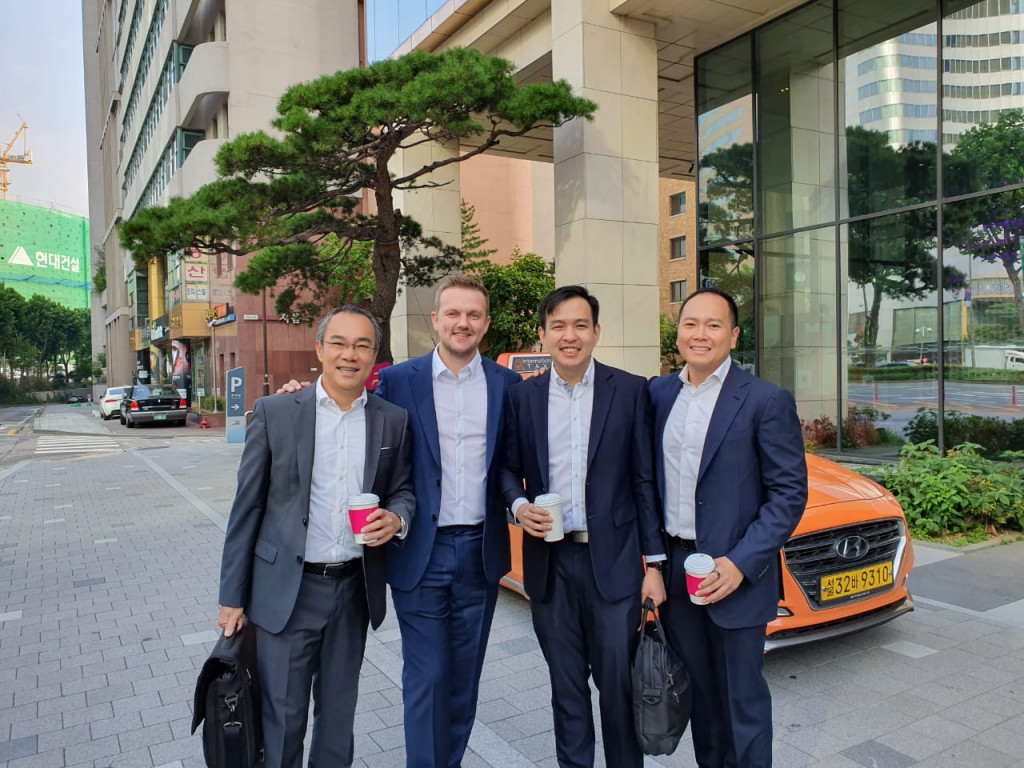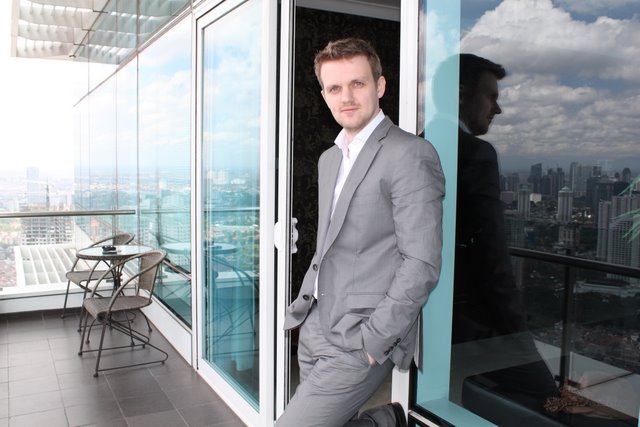Arnold Egg Passionately Speaks about the Future in Digital Industry
From e-commerce, travel industry and back again to e-commerce, Arnold Egg's journey in growing his passion in digital
This article is a part of DailySocial’s Mastermind Series, featuring innovators and leaders in Indonesia’s tech industry sharing their stories and point of view.
It has been over 20 years since Arnold Sebastian Egg, or familiarly known as Arno Egg, arrived in Indonesia. During that time, he has been trying to build a business in this country, working in and out of e-commerce, making its way to the travel industry, until he found his passion in digital.
The holiday is what brought Arno to Indonesia, but doing digital business is what makes him stay. He started quite young with Tokobagus, spending over three years until finally get real traction, deciding to merge, and eventually left to build his own digital venture. In 2013, he finally got rid of all the limitations and became an Indonesian citizen to stay close to the market.
Arno is a product guy, he builds products based on what consumer needs. However, he still suggests that it's not really appropriate to fall in love with your product and to listen to the people. He had wiped up a sweat and tasted sweetness in building startup from scratch. Tokobagus was his first legacy. He is now focused on developing digital products through Sprout Digital, and recently launched a new platform named Toco. Also, for the past 6 months, he's been involved as a Founding Partner in a Venture Builder called Wright Partners.
DailySocial had a chance to virtually met him and discussed the digital industry in this country, and he was really passionate about it. Let's hear more of the story.
When did you start to grow an interest in the tech industry?
I was one of those kids who occupied the first and only PC at school. I started at a very young age, and developed an interest in the computer field, then become the first batch of computer science students. At first, I studied in Rotterdam then moved to the US to catch up with the stuff I'm trying to learn. After that, I went back to Holland.
How did you end up in Indonesia? What makes you stay?
I went on holiday to Indonesia. I did enjoy sitting on the beach, then I find my way to the warnet and started talking to people over there. That’s how I started doing digital stuff in Indonesia. It is the best place for digital products in my opinion.
I'm from Holland, originally, already in Indonesia for a long time. What I know is in order to be successful, you need a big audience. In Europe, it’s very difficult because every country has its own different culture, which makes it a bit difficult to scale. In Indonesia, whether there are many different cultures, the way people do stuff is still the same. That’s why I started my digital journey in Indonesia.
Back then, it was difficult indeed, the internet was very expensive, even if there’s a big audience, nobody was able to go online. Therefore, in the early days, I started to set up a software house in Bali, building stuff for the European market, as a side project. It was the origin of Tokobagus.
So, Tokobagus used to be a side project, what's the story behind that?
It was a funny story I told many times. It was from a client in Holland want to set up a classified business and then failed and blamed us for spending a lot of money without significant results. It was quite difficult to acquire users and finally run out before it was able to go into the market. I think most people forget that if you start a digital company, it takes quite a long time to get traction.
For Tokobagus, it was between 2005-2008 until we get real traction, around 3 years. I think what was the biggest lesson here, is you have to be patient. As the company grows, people have been doing stuff together in the current market, they merge with other companies. We acquired Berniaga because it’s clear that we both are fighting for the same spot. It just makes sense, and we can focus our energy and sources to develop the product and serve the consumers. It was also to bring peace to the market.
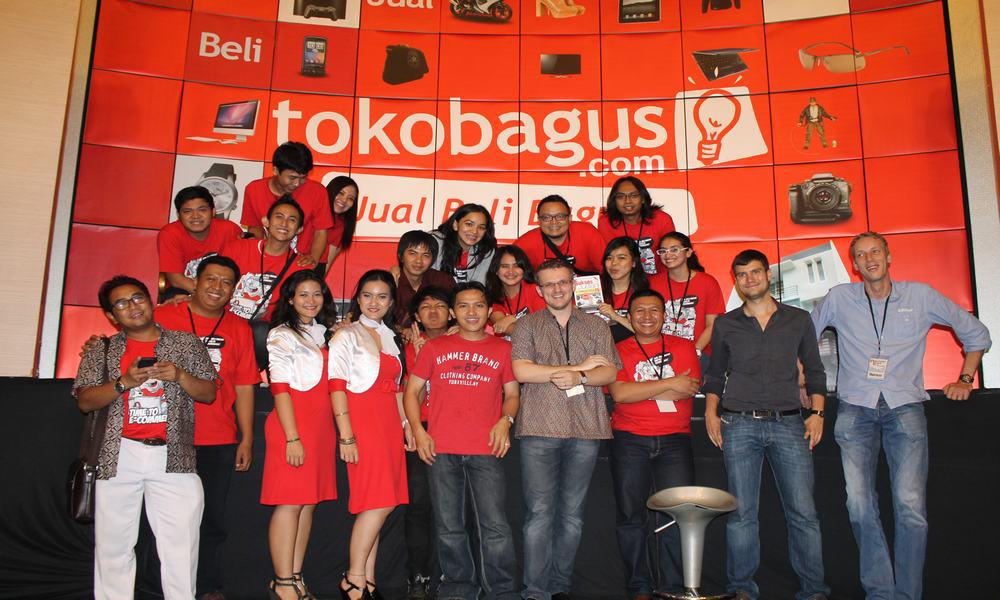
Not long after Tokobagus, you've started a new venture in the travel industry. How was it?
When I left, I had a very tight non-compete clause with Tokobagus, so I wasn’t able to do anything in the e-commerce base. After some research, the only thing I can do at the time was OTA. During that time I was also able to become Indonesian and keep close to the market, the situation is even better for me. When I was a foreigner, doing business in Indonesia is quite a challenge with all the limitations.
The travel industry was a very amazing journey but very difficult for me. Even though it’s getting more digital, it's still quite a conventional internet way. My only experience in OTA was being on the side of the table. I spent those days setting up a network, getting context with the stuff. As soon as my limitation expired, I was able to get back into the e-commerce base. Even though I enjoy the journey, it was a very difficult battle to win, there were lots of big players with good funds and have been in the game for much longer. Also better companies with experience, therefore, it’s ok to fall, next!
Next, you did come back to the e-commerce industry. Can you share the journey?
Went back to e-commerce, I managed to work for the corporate, I was extra help for setting up the online channel for HP which focusses on the consumer and SMB market in Indonesia. In corporate industry, they do things totally differently. Even though they have amazingly strong products, it's still quite slow in the digital pace. It wasn't that very long journey, but I learned many things. It gave me insights on how to move on the market in corporate's ways and how they execute differently than other digital startups. After that, I got asked by a friend to help out to set up the digital product in Lippo.
I jumped to Lippo mainly to set up a digital bank, which is now known as OVO. Because we were doing a lot of research, in the meantime, I also helped with MatahariMall.com (E-Commerce Marketplace), Mbiz.co.id (No.1 B2B e-procurement in Indonesia), and Red Carper Logistics (RCL - Logistics company specialized in last-mile fulfillment). However, OVO was my first deployment in the fintech space. Which is fun, because I like to do new things. We need to learn how to do the core banking system, switches, and how payments are done in Indonesia. It’s a great journey to learn so many and understand how normal banking works and how we can disrupt in that sense.
You’ve been into the e-commerce, travel industry, also fintech. What is your actual passion?
My passion is digital. I’m super happy that these days digital is just how normal business works. In that way, you need to be active in the digital space to be able to survive. It’s happening at a very fast pace. Indeed, my initial passion is in e-commerce, and while I manifest my time there, I still enjoy doing a lot of other stuff.
I’m happy with Sprout digital, helping people to set up new products, also do corporate venture building. During my time in Lippo or Bizzy, I had a lot of ideas that I was unable to get approval for or funding for. However, I can now execute that on my own and get that out into the market and ready to serve the Indonesian market. Whenever things pop out in my mind and I have time and work to try out and see what happens. I feel blessed.
At a certain period, you have to work and maintain several companies in parallel. How could you manage?
It’s very important to put your trust in the right people around you and good connection with all the people you work with. If you have a good layer around you then, it can make it easier, because they can fetch you the information you need to make decisions. In OVO we didn’t have that layer yet, so everybody reported directly to me, and it’s important to know everybody.
When you build connections, it's not only at the working level but also on the private level, therefore, you can understand what people go through. I personally don’t believe everybody can function 100% all the time. There are always ups and downs. Everybody has personal issues and work issues. If you’re able to have a sense for that and you give people space when they need space. That’s important as well.
When you first come to Indonesia as a non-native, what was your impression of this country? Do you find it difficult to adjust?
Of course, that takes some time. I came from Europe and the pace is not as fast as when I live in Bali. In Jakarta, it’s getting more alive. For me, as I was quite young when I arrived, I was able to adjust easily, just try to mix in. I was the same kid as every foreigner. Arrived in Indonesia, I want to work here, so learn the language as fast as I can. Although English is fine, because people speak in English everywhere, when it comes to specific purposes, it's really important to understand the locals. You’ll get a lot of information when you talk in the same language.
You’ve set up several companies, what makes you believe in the Indonesian market?
I think Indonesia is the perfect market for digital. It was quite a disappointment for some global investors that never put Indonesia on the map. There are so many islands and digital can bring equality to the market. It’s not done yet until this very day, I was working to digitize the supply chain for logistics, working on some projects with farmers to make sure those outside of Java can stay in the playing field. Infrastructure is not optimized yet and there are so many processes that are still inefficient, it’s such a broad country. Digital is an amazing tool to make it more efficient and put Indonesia in a competitive position in the region.
In school I learned a lot about Indonesia, there are lots of touchpoints in my past. I’m happy to call Indonesia my home at least, to be able to live my dream, Indonesia is the best market to do so. It has all the ingredients to be a very strong country. With all the unicorns and big players, if you compare to the other market in the region. There were lots of winners in the competition and the market is already educated. I’m so energized by knowing that.
Tell me about your current venture, Sprout Digital. What is your vision?
For me, Sprout is a foundation. I have a few objectives with Sprout, it’s to place new talents into the market. I’m so happy to see many people who previously in Tokobagus are currently having good positions in the market. That’s something I want to do here as well. I have a lot of young people, who only started in the digital industry. I want to give them the right tools to make it successful in the future.
And of course, Sprout enables me to set up those products which I like to have myself. We've just launched Toco. From the beginning, the Tokobagus story was never finished. Seeing e-commerce getting less and less worthwhile for smaller players made me think that it was time to pick up where I left off. Toco is now the same as Tokobagus in the past, but we will continue adding features to enable users to buy and sell more conveniently without taking away their hard-earned profit. Making it more transparent. At the moment it is a C2C and that will move more and more to a mixed marketplace where you have C2C and B2C mixed. The process will be slow but sure.
My mind always thinking about new things. Besides supporting a lot of companies to succeed in the digital space, Sprout enables me to be able to get those ideas out of my mind into products which people can start using.
It’s terrible what happened to the world, really painful to see people suffering because of Covid, not only in health but also in business. But there’s only one thing that’s positive, to speed up the education of the market. I went to Lampung for a project to help farmers. I saw everybody have smartphones for their children's education. And that speeds up the whole digital process, people start to understand how to use it. It’ll move the distance closer between villagers and the urban population. Digital transformation is helping balance the level out of this playing field and moving everybody under the same phase.
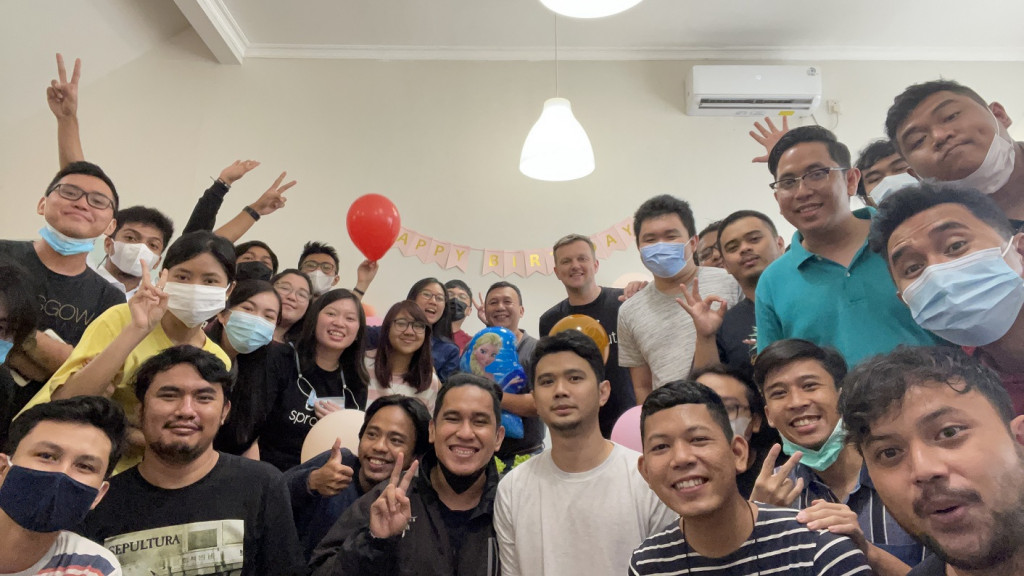
In this digital era, how do you picture our tech industry will be in the future?
I’m happy to see how people are now setting up their businesses. Indonesia on its own is already an interesting market, we don’t have to look very much into the global from the beginning. If you want to start something in Indonesia, if you’re successful it’s a big market to serve. Not that I don’t see Indonesia can compete in the global market, I think in the future we might be able to. But I think it’s also important to take it a step at a time. Don’t do it because you want to, if there's a demand for it, please do. For me, It’s good enough to be successful in Indonesia, going global is never really my biggest objective.
Organic growth is fundamental. You can speed up things a little but you should not implode buying all your users. It’ll leave you with nothing. I admit to being old-fashioned, it makes me against the odds. For me, it’s all about PnL (profit and loss). Does this business make sense? can you scale it? If you scale it, does it still make money or not? I was doing products because I want to serve customers. I understand the customers, what they need, and the problems. I think that’s also why Indonesian companies can compete with the global players as they arrived. Amazon, eBay, Rakuten don’t understand the users as we were understanding our customers. It was an eye-opener experience.
However when it comes to investment, it’s something that people should understand. Companies are bragging about how they raise more money while what they should really do is to focus on building the proper company. It’s important to make the investment climate healthy.
You’ve started several companies, anything you want to say to those tech/digital enthusiasts trying to make it into this industry?
You need to love what you’re doing, therefore, every struggle would be fine because you enjoyed it. There’s no success story that happened from day one. It’s always a struggle, it’s always a fight. It’s very difficult to be successful. I’m saying because I experience it myself, every startup will be painful and have a lot of work. I started Tokobagus with my own domain, build it with a lot of my time. If I may say, bootstrap is a good way to start a business.
Don’t fall in love with your own product. If your consumers said they don’t like that, believe them. It’s ok to fail, it’s better to fail fast, than in the long term. Create a maneuver, pivot, understand what the consumer wants and do it again. If you want to do something totally new, be ready for an uphill battle because you need to educate the market. Note to self: Working is important but you need to find time to spend with your family and loved ones. It’s important to have the proper balance in life.
If you had the chance, would you go back to Holland and start a new venture?
Nah. In Indonesia, people like innovations, people like to try out new things. Every time I go back, it always scares me. I always do the exact same thing I’ve been doing. What I want to say is, they’re much slower in innovations, it’ll be very tiresome for me. I’m super blessed that I went to Asia. I'm now in the middle of the epicenter. Asia is where the innovation or new market is going to be for the perceivable future. I believe in things will go up and down. It's a fun time to be here. Why go back to the past?
Sign up for our
newsletter
 Premium
Premium
